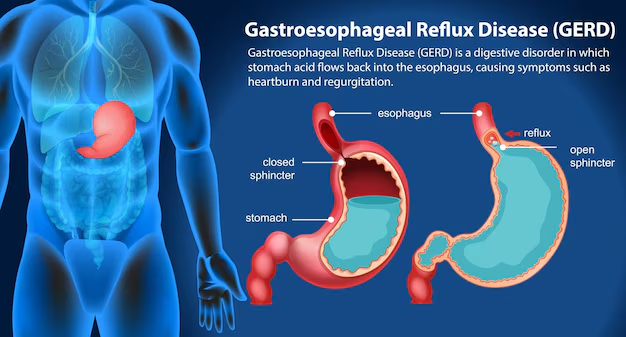
Dr. Piyush Gupta is one of the leading gastroesophageal reflux disease specialists in North Delhi, offering advanced and personalized care for acid reflux, GERD, and related gastrointestinal conditions. With years of expertise in medical and surgical gastroenterology, Dr. Gupta provides comprehensive GERD treatment in North Delhi, ensuring long-term relief and improved digestive health.

Dr. Piyush Gupta is one of the leading gastroesophageal reflux disease specialists in North Delhi, offering advanced and personalized care for acid reflux, GERD, and related gastrointestinal conditions. With years of expertise in medical and surgical gastroenterology, Dr. Gupta provides comprehensive GERD treatment in North Delhi, ensuring long-term relief and improved digestive health.
Gastroesophageal Reflux Disease (GERD) is a long-term condition that affects the connection between the esophagus and the stomach. It occurs when the natural barrier that separates these two structures becomes weak, allowing digestive fluids to move upward into the esophagus. Over time, this repeated reflux can irritate the lining of the esophagus, leading to discomfort and inflammation that may interfere with daily life.
GERD is more than an occasional episode of acidity—it’s a chronic disorder that often requires ongoing care and lifestyle adjustments. The condition can impact eating habits, sleep quality, and overall well-being, making it essential to manage effectively. Regular monitoring and medical evaluation ensure that any complications, such as inflammation or tissue changes, are identified early and treated appropriately.
GERD is a widespread condition that can affect people of all ages. While it can cause significant discomfort and complications, early diagnosis, lifestyle modifications, and effective treatment can manage symptoms and improve quality of life. In chronic cases, medical or surgical intervention may be required. With proper management, most people with GERD can lead healthy, symptom-free lives.
Acid reflux is the occasional backflow of stomach acid into the esophagus, which can cause heartburn. GERD (Gastroesophageal Reflux Disease) is a chronic, more severe form of acid reflux where symptoms occur frequently (more than twice a week) and may lead to complications if untreated.
The hallmark symptoms include persistent heartburn, regurgitation of food or sour liquid, difficulty swallowing, chest pain, chronic cough, sore throat, and hoarseness. Some people may also experience disrupted sleep due to nighttime reflux.
You should consult a doctor if you experience symptoms more than twice a week, if medications don’t relieve your symptoms, or if you have trouble swallowing, chronic cough, unintentional weight loss, or chest pain. These may indicate complications or more serious conditions.
Common triggers include spicy foods, fried or fatty foods, citrus fruits, tomatoes, chocolate, garlic, onions, caffeine, alcohol, and carbonated beverages. It’s best to track personal triggers, as they can vary from person to person.
While lifestyle changes and medications can effectively manage symptoms, GERD is usually a long-term condition. Some people may need lifelong treatment, while others may benefit from surgical procedures (like fundoplication or LINX device) if medications and lifestyle adjustments do not provide relief.